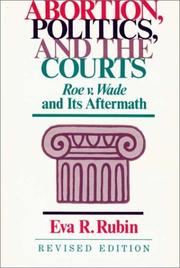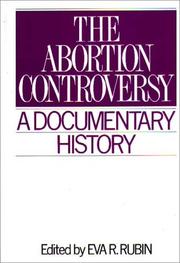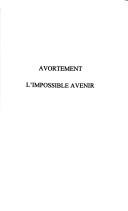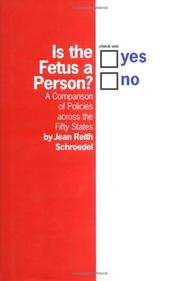| Listing 1 - 10 of 44 | << page >> |
Sort by
|

ISBN: 0313256144 9780313256141 Year: 1987 Volume: 89 Publisher: New York: Greenwood,
Abstract | Keywords | Export | Availability | Bookmark
 Loading...
Loading...Choose an application
- Reference Manager
- EndNote
- RefWorks (Direct export to RefWorks)
Abortion --- Law and legislation --- United States --- Abortion - Law and legislation - United States
Book
Year: 1988 Publisher: Cambridge New York Sydney Cambridge University Press
Abstract | Keywords | Export | Availability | Bookmark
 Loading...
Loading...Choose an application
- Reference Manager
- EndNote
- RefWorks (Direct export to RefWorks)
Book
Year: 1997 Publisher: Berkeley, Calif. Los Angeles London University of California Press
Abstract | Keywords | Export | Availability | Bookmark
 Loading...
Loading...Choose an application
- Reference Manager
- EndNote
- RefWorks (Direct export to RefWorks)

ISBN: 0313284768 Year: 1994 Volume: *1 Publisher: Westport, Conn. Greenwood
Abstract | Keywords | Export | Availability | Bookmark
 Loading...
Loading...Choose an application
- Reference Manager
- EndNote
- RefWorks (Direct export to RefWorks)
Abortion --- Law and legislation --- History --- Sources. --- Sources --- United States --- Abortion - Law and legislation - United States - History - Sources.

ISBN: 2738498329 9782738498328 Year: 2000 Publisher: Paris : L'Harmattan,
Abstract | Keywords | Export | Availability | Bookmark
 Loading...
Loading...Choose an application
- Reference Manager
- EndNote
- RefWorks (Direct export to RefWorks)
Abortion --- Avortement --- Psychological aspects --- Aspect psychologique --- History. --- Law and legislation --- Abortion - History. --- Abortion - Law and legislation - France.

ISBN: 0801437075 Year: 2000 Publisher: Ithaca (N.Y.) : Cornell university press,
Abstract | Keywords | Export | Availability | Bookmark
 Loading...
Loading...Choose an application
- Reference Manager
- EndNote
- RefWorks (Direct export to RefWorks)
Abortion --- Fetus --- Law and legislation --- States. --- Legal status, laws, etc. --- United States --- States --- Fetus - Legal status, laws, etc. - United States - States. --- Abortion - Law and legislation - United States - States.
Book
ISBN: 9782200249489 2200249489 Year: 2012 Publisher: Paris: Armand Colin,
Abstract | Keywords | Export | Availability | Bookmark
 Loading...
Loading...Choose an application
- Reference Manager
- EndNote
- RefWorks (Direct export to RefWorks)
Les lois Veil, l'une en 1974 sur la contraception et l'autre en 1975 sur l'IVG, sont à compter parmi les événements fondateurs de l'histoire du XXe siècle. Cet ouvrage en reconstitue la généalogie depuis la fin du XIXe siècle où s'ébauchent les politiques de répression. Insérées dans la séquence des années 1968 et dans l'histoire du mouvement féministe, la fabrication du consensus social, politique et parlementaire autour des libertés de contraception et d'IVG et la persistance des oppositions politiques et religieuses sont analysées en détail jusqu'à l'étape du renouvellement de la loi sur l'IVG en 1979, puis de son approfondissement en 1982 et en 2001. Il s'agit aussi de comprendre le processus de mémorialisation de cet événement. L'étude historique sur la longue durée permet d'expliquer les tensions entre l'événement, tel qu'il est désormais perçu, et les limites de la portée concrète de la loi sur l'IVG en raison de ses restrictions et des difficultés de son application.
Abortion --- Birth control --- Feminism --- Law and legislation --- History --- Contraception --- Abortion - Law and legislation - France --- Birth control - Law and legislation - France --- Feminism - France - History - 20th century
Book
ISBN: 9780190904845 9780190904838 9780190904852 9780190904869 0190904844 0190904836 Year: 2019 Publisher: New York (N.Y.): Oxford university press,
Abstract | Keywords | Export | Availability | Bookmark
 Loading...
Loading...Choose an application
- Reference Manager
- EndNote
- RefWorks (Direct export to RefWorks)
Most arguments for or against abortion focus on one question: is the fetus a person? In this provocative and important book, David Boonin defends the claim that even if the fetus is a person with the same right to life you and I have, abortion should still be legal, and most current restrictions on abortion should be abolished. Beyond Roe points to a key legal precedent: McFall v. Shimp. In 1978, an ailing Robert McFall sued his cousin, David Shimp, asking the court to order Shimp to provide McFall with the bone marrow he needed. The court ruled in Shimp's favor and McFall soon died. Boonin extracts a compelling lesson from the case of McFall v. Shimp--that having a right to life does not give a person the right to use another person's body even if they need to use that person's body to go on living-and he uses this principle to support his claim that abortion should be legal and far less restricted than it currently is, regardless of whether the fetus is a person. By taking the analysis of the right to life that Judith Jarvis Thomson pioneered in a moral context and applying it in a legal context in this novel way, Boonin offers a fresh perspective that is grounded in assumptions that should be accepted by both sides of the abortion debate. Written in a lively, conversational style, and offering a case study of the value of reason in analyzing complex social issues, Beyond Roe will be of interest to students and scholars in a variety of fields, and to anyone interested in the debate over whether government should restrict or prohibit abortion.
Book
ISBN: 9780415884686 9780203841167 9780415884693 0203841166 0415884683 0415884691 Year: 2010 Publisher: New York: Routledge,
Abstract | Keywords | Export | Availability | Bookmark
 Loading...
Loading...Choose an application
- Reference Manager
- EndNote
- RefWorks (Direct export to RefWorks)
Book
ISBN: 9781107170933 9781316758441 9781316621851 1316621855 1107170931 1316758443 1316762297 1316767337 Year: 2018 Publisher: Cambridge: Cambridge university press,
Abstract | Keywords | Export | Availability | Bookmark
 Loading...
Loading...Choose an application
- Reference Manager
- EndNote
- RefWorks (Direct export to RefWorks)
This book features opening arguments followed by two rounds of reply between two moral philosophers on opposing sides of the abortion debate. In the initial opening essays, Kate Greasley and Christopher Kaczor lay out what they take to be the best case for and against abortion rights. In the ensuing dialogue, they engage with each other's arguments and each responds to criticisms fielded by the other. Their conversational argument explores such fundamental questions as: what gives a person the right to life? Is abortion bad for women? And what is the difference between abortion and infanticide? Underpinned by philosophical reasoning and methodology, this book provides opposing and clearly structured perspectives on a highly emotive and controversial issue. The result gives readers a window into how moral philosophers argue about the contentious issue of abortion rights, and an in-depth analysis of the compelling arguments on both sides.
Abortion --- Fetus --- Human Rights --- Law and legislation --- Legal status, laws, etc. --- Professional ethics. Deontology --- Ethics of family. Ethics of sexuality --- Medical law --- Abortion - Law and legislation --- Fetus - Legal status, laws, etc. --- Human rights. --- Law and legislation.
| Listing 1 - 10 of 44 | << page >> |
Sort by
|

 Search
Search Feedback
Feedback About UniCat
About UniCat  Help
Help News
News